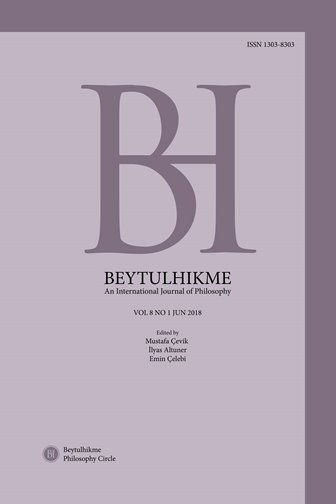Author :
Abstract
Doğa bilimlerine göre, yıkıcılık doğal seçilimin rekabetçi durumuyla ilgilidir. Bu anlamda, doğa, bütün canlıların bitmek bilmeyen bir rekabette yalnızca kendi hayatta kalmalarını istedikleri bir savaş alanı gibi düşünülür. Yine de, doğaya dair bu algı, evrensel çatışmanın bu sahte gerçekliğinin 16. ve 17. yüzyıllara ait sosyal yapının bir yansıması olarak felsefede zaten bulunması dolayısıyla doğa bilimleri tarafından keşfedilmemiştir. Bilim adamları, yaşadıkları toplumsal yapıyı evrensel olarak ve savaşın durumunu yadsınamaz bir gerçek olarak gözlemledikleri halde, doğa görüşünü ödünç aldılar. Bu makale, siyaset felsefesinin bilimsel paradigma üzerindeki etkisi hakkındaki sorunu gündeme getirmeyi ve yıkıcılığın siyasi ve sosyal kaynağını anlamayı amaçlamaktadır.
Keywords
Abstract
According to natural sciences, destructivity is related to the competitive state of the natural selection. In this sense, nature is considered like a battlefield where all creatures only seek for their own survival in an unending rivalry. However, that perception of nature was not invented by natural sciences insofar as this pseudo-reality of universal conflict was already present in philosophy as a reflection of the social structure of the 16th and 17th centuries. Scientists borrowed that vision of nature as they observed the social structure in which they lived as universal and the state of war as an undeniable fact. This article aims to raise the question about the influence of political philosophy on the scientific paradigm and to understand the political and social source of destructiveness.
Keywords
- Adorno, T. W. (1981). Negative Dialectics. New York: Bloomsbury Aca- demic.
- Allan, K. (2014). The Social Lens: An Invitation to Social and Sociological The- ory. California: SAGE Publications.
- Bauman, Z. (2005). Liquid life. Cambridge & Malden: Polity Press.
- Coser, L. A. (1956). Functions of Social Conflict. New York: The Free Press.
- Dermange, F. (2003). Le Dieu du Marché : Ethique, Economie et Théologie dans l’Oeuvre d’Adam Smith. Genève: Labor & Fides.
- Ewen, S. & Ewen, E. (2011). Typecasting: On the Arts and Sciences of Human Inequality. New York: Seven Stories Press.
- Freud, S. (1964). On Metapsychology: The Theory of Psychoanalysis . London: Penguin Books.
- Freud, S. (1961). Civilization and its Discontents. New York: Norton & Company.
- Fromm, E. (2010). On Disobedience: Why Freedom Means Saying No to Pow- er?. New York: Harper Collins.
- Fromm, E. (1969). Escape from Freedom. New York: Avon Books.
- Fromm, E. (1973). The Anatomy of Human Destructiveness. New York: Holt, Rinehart & Winston.
- Gauthier, D. (1977). The Social Contract as Ideology. Philosophy & Public Affairs, 6 (2), 130-164.
- Graeber, D. (2011). Debt : The First 5,000 Years. Brooklyn, NY: Melville House.
- Hobbes, T. (1588-1679). (1985). Leviathan. London: Norton & Company.
- Hull, D. L. (2005). Deconstructing Darwin: Evolutionary Theory in Con- text. Journal of the History of Biology, 38 (1), 137-152. http://doi.org/10.1007/s10739-004-6514-1
- Kuhn, T. S. (1957). The Copernican Revolution: Planetary Astronomy in the Development of Western Thought. Cambridge, MA: Harvard University Press.
- Kuhn, T. S. (1996). The Structure of Scientific Revolutions. Chicago: Univer- sity of Chicago Press.
- Von Linné, C. (1964). Carolus Linnaeus Systema Naturae, 1735. (Trans. M. S. J. Engel-Ledeboer & H. Engel). Amsterdam : nieuwkoop & B. de Graaf.
- Polk, D. B. (1995). The Island of California: A History of the Myth. Lincoln & London: University of Nebraska Press.
- Ritvo, L. B. (1990). Darwin’s Influence on Freud: A Tale of Two Sciences. New Haven & London: Yale University Press.
- Schumpeter, J. A. (2003). Capitalism, Socialism and Democracy. London & New York: Routledge.
- Simmel, G. (1987). Philosophy de l’Argent. Paris: PUF.
- Simmel, G. (1989). Philosophie de la Modernité. Paris: Payot.





